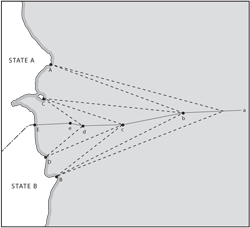in the international law of the sea, human activities in the ocean are regulated according to multiple jurisdictional zones. Thus the spatial distribution of jurisdiction of States is the foundation of oceans governance. In determining the spatial extent of coastal State jurisdiction, a question that may arise is the situation where the jurisdiction of two or more coastal States overlaps. In this case, delimitation of the overlapping marine spaces is at issue. This chapter will deal with rules of international law with regard to maritime delimitation, focusing mainly on the following issues:
(i) What is the cardinal principle applicable to maritime delimitations?
(ii) What are the basic approaches adopted by international courts and tribunals with regard to maritime delimitations?
(iii) What are the advantages and disadvantages of the basic approaches to the law of maritime delimitations?
(iv) What are the principal relevant circumstances in the law of maritime delimitation?
(v) What is the role of international courts and tribunals in the development of the law of maritime delimitations?
(vi) How is it possible to reconcile the requirement of predictability and that of flexibility in the law of maritime delimitations?
The spatial ambit of coastal State jurisdiction over marine spaces in the law of the sea is, in principle, defined on the basis of distance from the coast. In this regard, a question which may arise is how it is possible to delimit marine spaces where the jurisdictions of two or more coastal States overlap. Without rules on maritime delimitation in spaces where coastal State jurisdictions overlap, coastal States cannot enjoy the legal uses of maritime spaces effectively. Hence the law of maritime delimitation is of paramount importance in the law of the sea. In this regard, particular attention must be drawn to two issues.
The first issue relates to the quest for a well-balanced legal system that reconciles predictability and flexibility in the law. In common with all types of law, the law of maritime delimitation must have a certain degree of predictability. On the other hand, as each maritime delimitation case differs, flexible consideration of various geographical and non-geographical factors is also required with a view to achieving equitable results. How then is it possible to ensure predictability, while taking into account the infinite variety of geographical and non-geographical situations in order to achieve an equitable result?
While predictability versus flexibility of law is a classical dilemma in the legal field, it is of particular concern in the law of maritime delimitation.
The second issue involves change and continuity in the law of maritime delimitation. In essence, the law of maritime delimitation has been developed by international courts and tribunals. In this respect, it is important to note that international courts’ approaches to maritime delimitations may change with the passage of time. Hence there is a need to analyse both change and continuity in the case law relating to maritime delimitation in order to clarify the direction of the development of the law in this field. Focusing on these issues, this chapter will present an outline of the international law of maritime delimitation.

